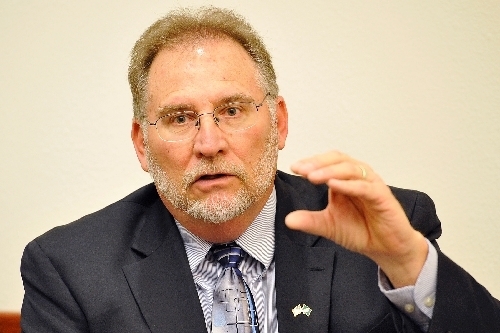State tries to reduce wait list of mentally ill who need housing
A call came to Las Vegas police in September 2013 about a 31-year-old man who was yelling and breaking things at his mother’s house.
He told officers he wanted to kill himself because it would be better than killing his mother. The man was put on a Legal 2000 hold, which allows someone considered a danger to themselves or others to be held for evaluation for up to 72 hours.
Police received another call in November 2013 on the same man, who was found in the desert bathing himself with dirt.
Another Legal 2000.
Less than a month after that, the same man was creating a disturbance in the middle of traffic on a scooter and threatening to kill himself.
Another Legal 2000.
In January, the man was found wandering with a knife claiming he was being chased by demons.
Another Legal 2000.
Later the same month, police came in contact with the man again as he disturbed a large group of people.
Another Legal 2000, the fifth in four months.
That is just one example of the repeat offenders who are placed on mental evaluation holds, said Sherry Harney, an officer with the Metropolitan Police Department who coordinates the Crisis Intervention Team.
“Housing and medication are key” to prevent people from cycling in and out of hospital emergency rooms and jail, according to Mike Willden, director of the Nevada Department of Health and Human Services.
But funding for housing is tight. The Southern Nevada Adult Mental Health Services agency alone has 148 mentally ill people on a waiting list for housing assistance, said Ellen Richardson-Adams, deputy administrator of clinical services for the Nevada Division of Public and Behavioral Health. Those waiting could include individuals who have been successfully triaged at emergency departments throughout the valley and those receiving inpatient care.
“We have made efforts to address the issue,” she said. “The wait list has gone down since Feb. 6 when there were 156 people.”
On Feb. 6, the Legislature’s Interim Finance Committee approved $4.5 million in grants and other funds that will go toward Southern Nevada Adult Mental Health Services’ housing programs.
The agency changed its residential housing procedures in December, making its housing programs available to a broader population, which in part has to do with reducing the wait list.
Before the changes, people had to have a serious mental illness to be eligible, Richardson-Adams said. Now it focuses on all the individual’s needs.
Officials housed seven people in the past week, but more have been added to the list, Richardson-Adams said.
As officials work through the wait list, they are aware that beginning July 1, fiscal 2015, there could be more need. The agency would have to operate under the already approved budgets that roughly add up to $11.7 million and don’t include additional funding received in fiscal 2014 to help with the problem.
Until a system is developed to provide residential treatment and case management, those who are “super-users” will continue to be in and out of emergency departments and jail, Dr. Dale Carrison, chief of staff and head of emergency services at University Medical Center said on Thursday.
“They certainly need residential areas,” he said. “They just end up in a revolving door.”
Tim Burch, director of the Clark County Department of Social Services said his agency also has a waiting list for people who need permanent housing assistance funded through the U.S. Department of Housing and Urban Development. There were 143 people on that waiting list for housing assistance.
Reporter Yesenia Amaro can be reached at yamaro@reviewjournal.com or 702-383-0440.

















